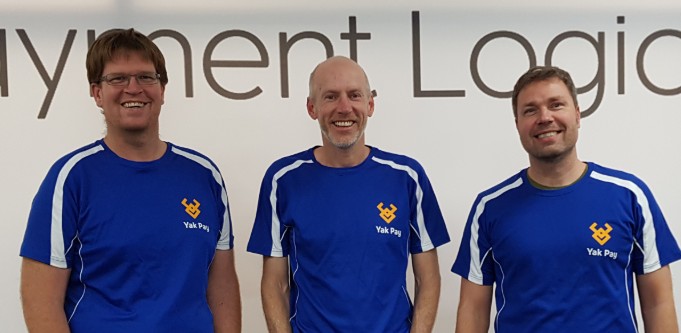
Payment Logic chief financial officer Chris Hodge, chief executive officer Sam Plowman and chief technology officer Mark Nimco (left to right). Source: supplied.
Aussie fintech Payment Logic has secured a partnership with credit card giant Visa, to get its payment platform product into the hands of even more SMEs.
Founded in 2013, Payment Logic has been in partnership with American Express for the past six years or so, acting as a payments platform for small businesses who found their credit cards weren’t accepted by suppliers.
The new venture, Yak Pay, although launched in partnership with Visa, will provide the same service for both Visa and Mastercard customers.
The offering is designed to save small businesses time, allowing them to pay “100 invoices in seconds”, co-founder and chief Sam Plowman tells StartupSmart.
But, it’s also designed to be as secure as possible, and affordable.
Yak Pay will only take a 1% servicing fee for processing payments, he says.
“That’s the best value price in the marketplace.”
Finally, it means small businesses can offer to pay suppliers early, giving them negotiating power. Through the platform, they’re effectively paying via bank transfer while leveraging the credit they have with the card provider.
The supplier gets paid early, and the small business maintains positive relationships.
“It’s a very good proposition,” Plowman says.
Of course, for small businesses, cashflow and payment terms are critical.
“Normally, he or she that is bigger has the louder voice and the stronger negotiating position,” he explains.
“This is a way of rebalancing it a little bit.”
Currently, Payment Logic has more than 5,000 customers on its books. It’s currently processing over $1 billion in business-to-business payments, annually, and generating more than $20 million in servicing and processing fees.
“The growth revenue is pretty significant,” Plowman says.
“Business has grown very, very strongly.”
And, all of this has been done with no external funding to speak of.
“The business has been profitable from day one,” Plowman adds.
“We’ve been approached, but to this day we’ve consciously chosen to maintain our equity position and funnel back every dollar that we make into the growth of the business.”
Right place, right time, right product
Securing partnership with financial giants such as Amercian Express and Visa is the ultimate dream for many startups. But Plowman says there’s no easy way to get there.
Both relationships were the fruit of “a big investment of time and effort”, he says.
“It is hard work … but it can be very rewarding once you get there.”
Success here comes from a blend of being in the right place at the right time, and having an offering that can really drive value for your partners’ end users.
“Sometimes you need to have the right proposition at the right time,” Plowman explains.
“But, that’s the whole idea of being a fintech — trying to pick you moment and shine while that sun’s out.”
Equally, having the first partnership played a part in securing the second. Having something similar in place that is already running successfully, and is mutually beneficial, doesn’t go unnoticed.
“The Visa partnership has been made easier due to the pathway we’ve had with American Express,” Plowman says.
“They saw what we were doing with Amex, they saw the opportunity to extend the business and add and complement the Payment Logic business.”
Getting them across the line also takes intrinsic willingness from the partner. Payment Logic was lucky in that Visa was proactively looking to work with a fintech, Plowman explains.
“They like the model, they like the third-party element, they like the fact that we’re nimble and fast, and they’ve tried to leverage that and benefit from it for their own card members.”
Bridging the divide
With a background in senior roles at NAB and ANZ, Plowman has been on both sides of the disruptor-disrupted divide.
“I have much greater appreciation now of what fintechs can offer and how they operate,” he says.
But, he suggests the divide doesn’t have to be quite so deep. There’s value in collaboration between startups and incumbents.
“There’s a lot of businesses out there that keep preaching about disruption,” he says.
“Our view is: how do we help the banks that have all this scale play a lot more efficiently?”
Big banks and financial organisations bring a lot of strengths to the table, he says. They have their brand names, their customer base and their sheer scale.
Fintechs, on the other hand, bring speed, innovation, technology and “an attractive essence of urgency”, he says.
“When you actually blend the two you can get a really good outcome. It’s not always one versus the other,” he adds.
“If you embrace working collaboratively and working together, you can help turn big ships a lot faster.”
NOW READ: Dinner deals startup Buddy scores Uber partnership after just six months of trading
NOW READ: Fintech DiviPay raises $2.3 million, securing backing from big-four bank


COMMENTS
SmartCompany is committed to hosting lively discussions. Help us keep the conversation useful, interesting and welcoming. We aim to publish comments quickly in the interest of promoting robust conversation, but we’re a small team and we deploy filters to protect against legal risk. Occasionally your comment may be held up while it is being reviewed, but we’re working as fast as we can to keep the conversation rolling.
The SmartCompany comment section is members-only content. Please subscribe to leave a comment.
The SmartCompany comment section is members-only content. Please login to leave a comment.